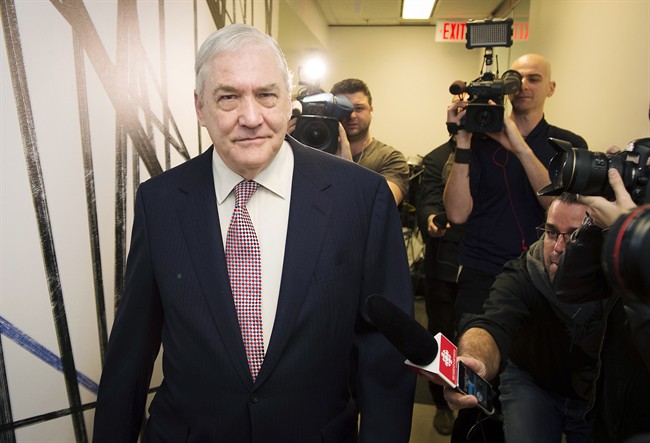TORONTO – Conrad Black said Friday that he’s fighting Canada’s largest securities regulator to protect his reputation, and not because he’s interested in becoming the director of a public company in Ontario again.

“I have absolutely no desire to be a director or officer of a public company – none,” Black testified at an Ontario Securities Commission hearing.
“But I do not think what I’ve endured justifies the implication that is clear in these proceedings, that I’m unfit to be one.”
It was the first time that the former Hollinger executive was allowed to testify publicly before the OSC, which oversees Canada’s largest stock market and many of its publicly traded companies.
He fought hard for the privilege and earlier this week was granted permission to speak for himself about the U.S. criminal convictions that he considers illegitimate.
“The United States government attacked me and my family in all sorts of places – including through the Internal Revenue Service, as well as the Securities and Exchange Commission, and the Department of Justice,” Black said.
“Obviously the correlation of forces between the United States government and myself is a very unpromising one, but I determined there was no alternative, since there was no legitimacy to any of the allegations, to fight as best I could, to fight all of them, everywhere, as long as it took.”
The provincial regulator is considering whether Black and former Hollinger chief financial officer John Boultbee should be banned from acting as directors, officers or registrants of public companies.
The OSC process had been sidelined for nearly a decade while Black faced numerous charges in the U.S. and ultimately served time in prison for two of them. Boultbee was convicted of one count of fraud in the U.S.

Get breaking National news
The regulator alleges Black, along with other directors and officers of Toronto-based Hollinger Inc. and Chicago-based Hollinger International, used non-competition payments to line their pockets with money that should have gone to the companies and their shareholders.
The payments were related to Hollinger International’s sale of a group of small newspapers in the United States.
Black said to some extent he feels “great remorse” for failing to fill certain positions at the company “with people that were entirely reliable.” He said it was “heartbreaking” to watch the company he spent 30 years building collapse.
“And not because I was the largest shareholder, though that of course was not the most pleasant experience either,” he said.
“The destruction of the property, the reduction in the quality of most of these newspapers. It was a terrible thing.”
Black had been a director of several major companies, including CIBC, and was both an officer and director of several of the companies within the Hollinger newspaper group that he also controlled as a major shareholder.
But he told the OSC panel he has no plans to hold that type of position again within Ontario’s jurisdiction, which includes most publicly traded companies on Canada’s largest stock exchange.
Black, a 70-year-old businessman who gave up his Canadian citizenship in order to accept an appointment to the British House of Lords in 2001, has always insisted that he didn’t break the law. He was successful in having most of the U.S. charges against him withdrawn and most of the convictions overturned after a series of appeals.
OSC lawyer Anna Perschy argued earlier this week that Black and Boultbee wrongly took $600,000 from Hollinger in the form of non-compete payments and that they have not taken responsibility for their actions despite convictions in the U.S.
As part of its case, the OSC wants to show Black has the potential to commit further acts of fraud on public markets, and that he doesn’t have remorse for his past actions.
Lawyers for the regulator also pointed to Black’s permanent ban from the U.S. Securities and Exchange Commission which prevents him from being an officer or director in the United States.
Black’s lawyer, Peter Howard, says lawyers for the regulator are giving a “myopic picture” of what really happened at Hollinger, that Black has served his time and there’s only an “infinitesimally small” chance that his client will run afoul of the law in the future.
The OSC case against Black began in 2005, but was adjourned while he faced criminal charges in the United States.
Of the many charges levelled against him by the U.S. Justice Department, Black was only convicted of one count of fraud and one count of obstruction of justice.
He served 37 months of a 42-month sentence in a Florida prison, and was fined US$125,000.
In his testimony, Black told the OSC he believes the regulator shouldn’t strive to “replicate” decisions from the U.S.
“I don’t think we should be in the business of rubber stamping what goes on here,” he said.
“There’s sometimes room for a little subtlety, and I think Canada should not simply, as a reflex do what other countries do. ”
The hearing was adjourned until Oct. 28 while both sides prepare their submissions.






Comments